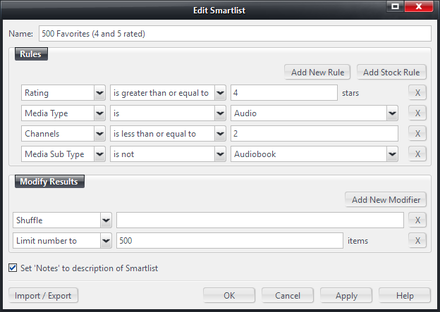Smartlists: Difference between revisions
No edit summary |
|||
| Line 44: | Line 44: | ||
Users of Media Center have created almost every kind of Smartlist imaginable, from complex searches built on MC's Expression Language to simple tools for one specific task. Look through the following collection for some examples of how to get started. If you need help or want further examples, drop by and ask on Interact. |
Users of Media Center have created almost every kind of Smartlist imaginable, from complex searches built on MC's Expression Language to simple tools for one specific task. Look through the following collection for some examples of how to get started. If you need help or want further examples, drop by and ask on Interact. |
||
* [[:Category:Search |
* [[:Category:Search Examples|Examples Collection]] |
||
==More== |
==More== |
||
Revision as of 04:22, 23 February 2015
As an alternative to playlists in Media Center, you can create smartlists. A smartlist is actually a dynamic playlist. One does not add specific items to a smartlist, but instead define a set of rules to select items from ones library. A simple smarlist, can be set to select songs recently added to the library, or songs from defined artist(s). For example, you can create a Smartlist that says: Play everything in my "Top 40 hits of 1989" Playlist EXCEPT for the Christmas songs and the songs by Aretha Franklin. Whenever you select to play a Smartlist, it will apply the relevant rule to your entire library, including any new songs you may have added to your library that meet the criteria of its rules.
Smartlists can be created for all types of media: music, video, images, documents, and even a mixture of all of them.
OR and AND operators can be used in smartlists by enclosing rules in () and using the operator between rules, eg:
([artist]=[Pink Floyd] or [artist]=[Genesis])
There is no end to the possibilities with smartlists, and here are some usages which might help making your "playlist-of-your-dreams". Remember there is a nice selection of pre-defined smartlists to choose from when you are creating a new smartlist.
Minor tips:
- [Duration]=<480
- Remove songs longer than 8 minutes. Use it when syncing with devices. This may remove those hidden track songs with extensive silent periods.
- ~s=1000
- Limits smartlist to be maximum 1000 MB. Use it to set a desired total smartlist size, when syncing with devices.
- A smartlist operates from left to right, just as the selection line was written.
Examples
1. [media type]=[audio] ~n=100
Selects first all audio files, then limits to 100 songs.
2. [media type]=[audio] [date imported]=<31d ~sort=[date imported]-d
Selects all files which has a import date newer than 31 day, and then sorts the list after the imported date.
3. [media type]=[audio] ~mix=300,50%,{[Rating]=>4},50%,{[Rating]=>3}
This is a bit more advance, but should be understandable. The mix is a very handy function for combining selects (or playlists and other smartlist for that matter). Each comma, seperates the operators. The first value defines the number of items to select in total. Next, one define the amount to select for the following query. It can be added as many querys as one likes in the mix. Here, to querys are added, one for selecting 50%(150 songs) rated 5, and the other 50%(150 songs as well) rated 4 or 5.
4. [Rating]==5 ~sort=[Last Played] ~n=20
Select the 20, rated 5 songs, which had the longest time since been played.
5. [media type]=[audio] ~mix=1000,25%,{[Rating]=>4},25%,{[Rating]=>3},25%,{[Rating]=>2},25%,{[Rating]=<1} ~nodup=[Artist],[Name]
Select randomly up to 1000 songs with rating 3 or higher (with higher density of higher rated songs), but 25% of them unrated. Remove duplicates.
6. [media type]=[audio] ~mix=20,50%,{[rating]=[],3,4,5 [date (year)]=2004-2006 ~sort=[number plays],[Last Played]-d,[date imported]-d ~%=50 ~sort=random},20%,{[rating]=[],3,4,5 [date (year)]=2000-2003 ~sort=[number plays],[Last Played]-d,[date imported]-d ~%=50 ~sort=random},15%,{[rating]=[],4,5 [date (year)]=1990-1999 ~sort=[number plays],[Last Played]-d,[date imported]-d ~%=50 ~sort=random},10%,{[rating]=[],4,5 [date (year)]=1980-1989 ~sort=[number plays],[Last Played]-d,[date imported]-d ~%=50 ~sort=random},5%,{[rating]=[],5 [date (year)]=<1980 ~sort=[number plays],[Last Played]-d,[date imported]-d ~%=50 ~sort=random} ~nodup=[Artist]
Select up to 20 songs from different artist, with focus on newly released and imported music, but also some old classics.
7. Using the "Modify Results": Mix : 800,30%,{p="Top Hits"},10%,{p="4 Star"},10%,{p="Favorite Artist"},10%,{p="3 Star"},20%,{p="4 Star"},10%,{p="Feel Good List"},10%,{p="All Music"}
Creates a smartlist with 800 songs populated from certain percents of other playlists within your Library. This for example contains: 30% of the smartlist "Top Hits", 10% of the playlist "4 Stars", and so on.
User Examples
Users of Media Center have created almost every kind of Smartlist imaginable, from complex searches built on MC's Expression Language to simple tools for one specific task. Look through the following collection for some examples of how to get started. If you need help or want further examples, drop by and ask on Interact.
